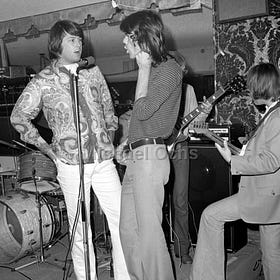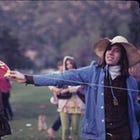Audio Autopsy, 1976: David Cassidy, "Gettin' It in the Street"-Beach Boys, America & Mick Ronson Influenced LP + the Unreleased "Then I'll Be Someone" by Carl Wilson/Tandyn Almer
A worldwide superstar for 5 years (1970-74), many of David Cassidy's fans seemed unwilling to "get" David 2.0. Fellow rockers, though, knew his talent, and lined up to record with him.
There are two types of people in this world, at least from a psychological POV: Those who view the glass as half-full, and those who see the glass as half-empty. This phenomenon is called perception, and our perceptions profoundly impact how we experience life. At least, that’s Jessica Estrada’s perception from her WellandGood.com article from February 2020.
“Perception molds, shapes, and influences our experience of our personal reality,” says Linda Humphreys, PhD, a psychologist and life, relationship, and spirituality coach. “Perception is merely a lens or mindset from which we view people, events, and things.”
Perception Sucks
It’s also not fair…which is probably why it sucks. If perception really was reality, David Cassidy’s name would be uttered with the reverence usually reserved for the Bowies, the Eltons, and all the other multi-talented singer/performing Rock’n’Roll Hall of Famers from the last several decades.
Instead, his name, when mentioned (and perceived by many, if not most of the music-listening public in the 21st century), is greeted with derision and probably a slight giggle and a sneer (except by millennials and those slightly older who have no idea who he was, and think The Partridge Family is some kind of ground-dwelling game bird featured on the Planet Earth DVD around the turn of the century, with narration intoned by David Attenborough).
The Willie Dixon standard, “Back Door Man,” may hold the secret:
Well, the men don't know,
But the little girls, they understand.
While Willie was likely tending to the screen door at the other end of his Mississippi shotgun cottage, he also was referring to the very notion of rock star adulation…the reason Liverpool’s Quarrymen picked up guitars in the first place: “To pull the birds.”
What explains David’s massive, planet-wide Partridge-fueled “Cassidy-mania” can also help us grok the professional relationships he had in his post-1974 Cassidy/solo recording landscape (now sans screaming post-pubertal girls) and his sudden new-found fandom, with lines up the street and around the corner made up of fellow musicians anxious to write, play, and perform with him.
To paraphrase Dixon: The record-buying public doesn’t know; but, the card-carrying AFofM local/NARAS/Hall-of-Fame members understand.
What Did They Get “The Rest of Us” Didn’t?
That David Cassidy was, in his prime, a generational guitar and keyboard player, surprisingly sophisticated songwriter, achingly emotive singer, and just all-around nice guy who couldn’t take a bad photograph. Richard Marx and Bryan Adams woulda killed for that bio on the back of their 8x10s!
But, with limited vocal prowess and songwriting creativity, and in one case, pock marks from adolescence, those two singer/songwriters sold millions. But, they’re perceived (because of their respective sales ledgers…only) as brilliant, “good” musicians (and, maybe they were…a debate for another treatise)! And, we’re back to the dubious nature of perceptions.
David Solo: It Took RCA 3 Albums in 2 Years to Assess
Still skeptical? Incredulous and not budging? Exhibit A: David’s 1976 album (and third and last for RCA Records), Gettin’ It in the Street (shown above). The hard radio stats and sales figures-reality began to set in: No U.S.-based record label would again release a Cassidy album until 1990.
And, even the UK (where he’s always been solo-huge) wouldn’t see a D.C. CD until a decade later, with 1985’s Romance, with songs written with and produced by veteran recording artist/performer, Alan Tarney. George Michael (uncredited) even took time off from Wham! to sing on a song, “The Last Kiss” (written by Tarney and Cassidy):
1976: The Little-Known Bowie-to-Cassidy Connection
From Cassidy’s 2007 autobiography, Could It Be Forever?, David talks about Mick Ronson (David Bowie’s early-’70s Ziggy Stardust-era guitarist) and his involvement on the album:
“His style was so different. There was nothing conventional about what he did, which is why it was so interesting. I think he was very flattered that I wanted him to play, but I think he was worried that [his] fan base in that avant garde, Velvet Underground kind of world was going to [abandon] him if he went too mainstream--from being David Bowie’s sideman to David Cassidy’s sideman. And, I don’t think he was wrong. But, we had great fun together.”
Gerry Beckley (with Dewey Bunnell, ‘70s hitmaking duo, America) in the book: “David and I were such big Mick Ronson fans. David had been a megastar around the world, but particularly in England. Mick had quite a bit to say during those sessions.
“I remember there was a song we were going back and forth on for this album that was written by Tandyn Almer, who had written ‘Along Comes Mary’ (Top Ten hit for The Association in 1966) David was fond of this song [‘Then I’ll Be Someone’], and I think we’d cut the track, and Mick came in and said, ‘What is that crap?’—Immediately it was off the album because David held Mick in such high esteem.
“Everybody had a voice, and this was a circle of people that David highly respected.”
Thankfully, tape exists of David, performing “Then I’ll Be Someone” on the UK’s Russell Harty Show from 1976:
FR&B went deep in uncovering songwriter, Tandyn Almer’s little-known life, here:
Toytown Psychedelia: Songwriter Tandyn Almer--Brian Wilson's Friend & Co-writer of 2 Beach Boys Songs + "Along Comes Mary"
He wrote songs with Brian Wilson. For the few (including this writer) who knew precious little about Tandyn Almer, that may be all you need to know: Right away, we’re now aware that he had enough of a precious musical cache that The Beach Boys’ tonal architect would eagerly invite him into his creative universe, and not be threatened by his gift or jeal…











Great piece, Brad! I especially enjoyed the deep dive into perception -- a psychological and, dare I say, emotional study into the phenomenon. I do question your assertion that Bryan Adams and Richard Marx were ever seen as brilliant, or more than marginally talented, even by the most generous of fans but then again I may have not run in those circles or read those magazines.
I am now inspired to go check out the DC catalog (when I can find the time!) after reading your praises.
Thank you very much for this really great article. It was such a shame that David Cassidy became a teen idol, and even some of his fans still cherish only his old 'Keith Partridge' image, not the music he recorded. But of course life is life, and there are many great musicians no one's ever heard about. That's showbusiness, the career choices DC made, also because first of all he wanted to be an actor, like his father. I love his music, his was one of the greatest voices of the 70s. Thank you again. I enjoy reading your articles very much.